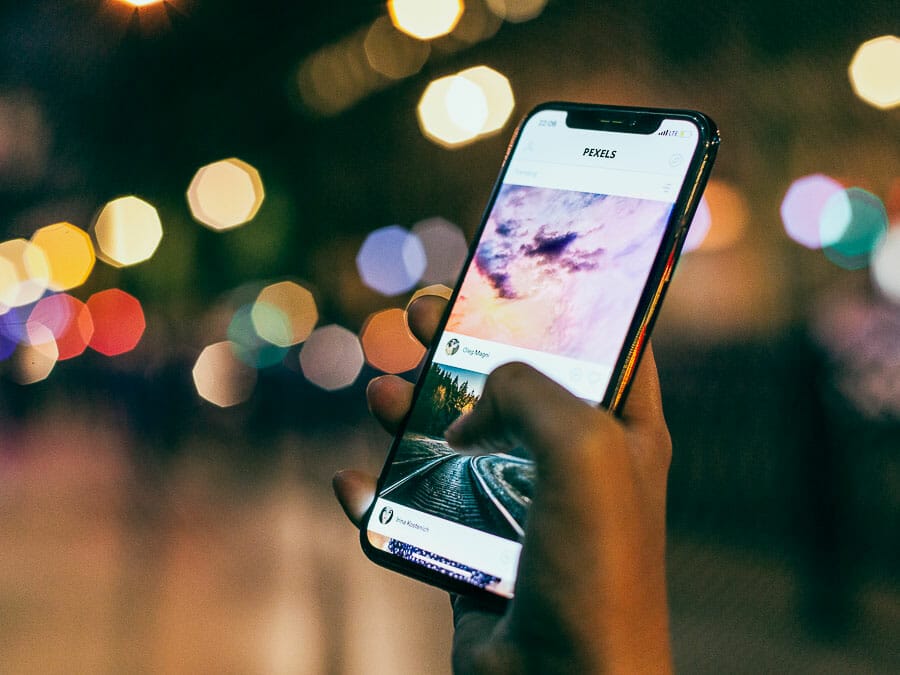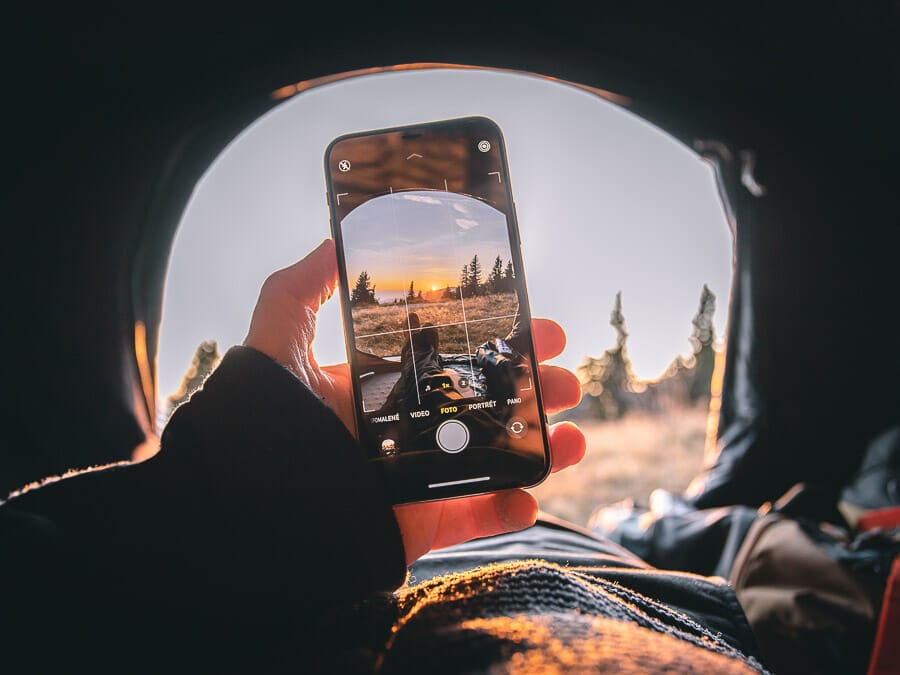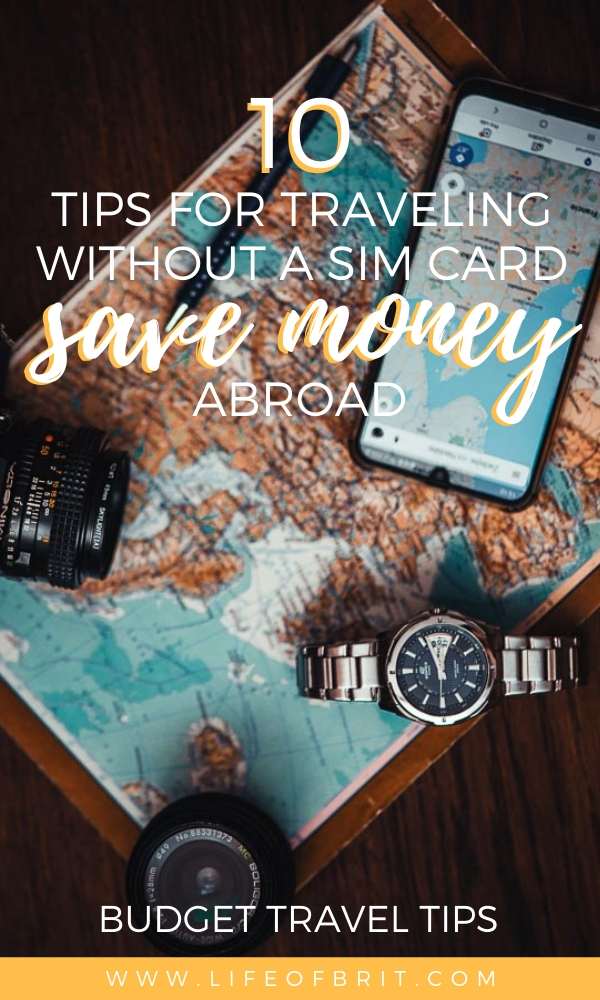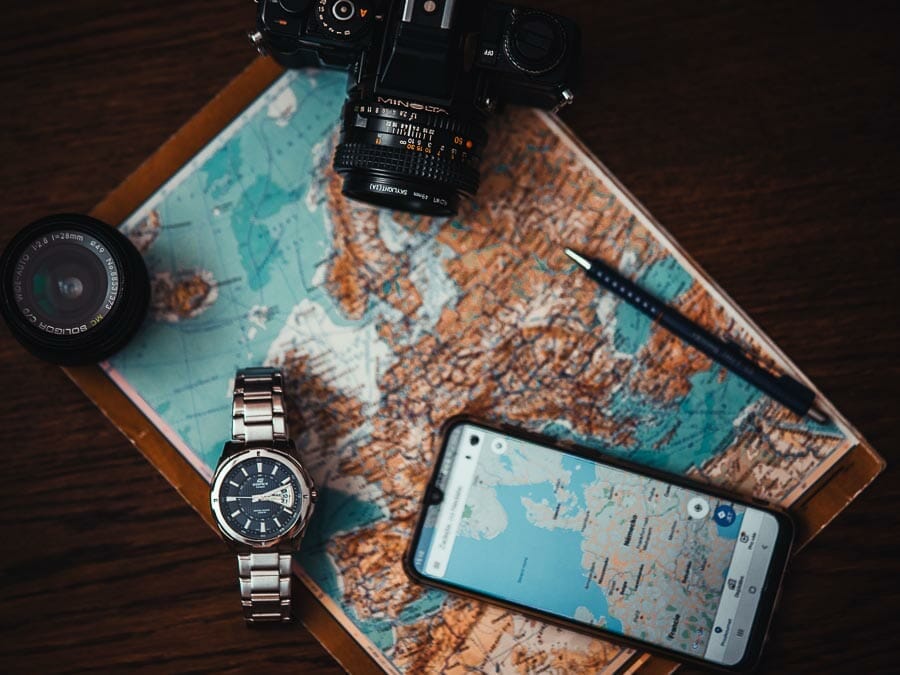Opt to disconnect on your future travels and skip getting a SIM card with these handy tips.
It’s becoming more and more uncommon to travel without a SIM card these days. With how well connected the world is, why would anyone forgo the convenience of having a wealth of information in the palm of their hands while visiting an unknown place?
But traveling without data actually has some pretty good benefits that you may not have considered. For one, opting to skip getting an international SIM can help you save money while you travel. In some countries it’s expensive and an unnecessary expense and your travel savings fund you worked hard to save for travel is precious!
Skipping a travel SIM card is also a great way to disconnect from home and fully enjoy a new destination, without the distraction of the internet. You don’t always get that opportunity anymore!
Whatever your reason, I’m here to give you all the tips for traveling without a SIM card that will help make your life more convenient while in a foreign place.

4 Reasons To Travel Without a SIM Card
I’m assuming you’re reading this because you’re planning on going abroad without a SIM Card. But in case you’re doubting whether or not that’s a good decision, here are a few good benefits to skipping a travel SIM card.
1. It’s a Great Opportunity to Disconnect from Your Home and Connect With Where You’re Traveling.
As helpful as our phones are for travel, they’re also a huge distraction. I’m a big Instagram user, and when I travel, I often take photos and share it to my stories. While I love taking the time to share with my friends, family, and followers what I’m up to, it also does take a chunk of time to do it.
Without a SIM card, that time is saved to focus fully on the present rather than my social media presence.
2. SIM Cards Can Be Expensive In Certain Countries.
I’m looking at you, Europe! Some countries in Europe charge high rates for temporary or pay as you go SIM Cards. In Germany, for example, a SIM card with only 2.5 GB of data is 25 euros. While not an insanely high cost, for those on a strict budget, it’s money that could cover a few nights of accommodation. Sometimes it’s just not a priority.
3. Getting a SIM Card Sometimes Isn’t An Option Or the Process for Getting a SIM Card is Just Too Difficult.
Not all countries make it easy for foreigners to pick up a SIM Card for temporary travel, or they only offer limited options. Japan is an excellent example of this, although I think they’ve loosened up a bit since I visited a couple of years ago.
4. The Trip is Too Short To Warrant the Effort to Get One
Sometimes your trip is just a long weekend, and the cost and effort of getting a SIM card aren’t worth the short time you’re going to be gone. Especially in Europe, where a new country is a hop skip and a jump apart. Continually switching SIM cards every time you’re in a new country is a lot. Unless you get a special SIM card for all of Europe that is!

10 Tips for Travel Without a SIM Card
Now that you’re about to embark on your exciting adventure fully prepared to be without a consistent connection to the internet, here are my best travel tips for living without a SIM card! I’ve been in this position a bunch recently myself and have found it doesn’t have to be painful.
And to ease your worries, so many places offer free WIFI. Surely your accommodation should have stable WIFI unless you’re going somewhere super off the beaten track and many restaurants, cafes, attractions, and more.
1. Plan Ahead.
Before you even leave home, make sure you have all of the important information you need for your trip and that you’ve read the ins and outs of WIFI access in the place you’re going. Where is your best chance to find WIFI once you’re there? Do cafes commonly offer it for free, or is it only at your accommodation you’ll have a connection? Take advantage of your last moments of consistent internet, so you’re not caught off guard once it’s gone.
2. Download All Necessary Apps Before Leaving Home.
As part of the plan ahead step, downloading all of your travel apps before your trip is super important. These are just a few of the travel apps that’ll save you money and help you when you’re without a constant internet connection.
XE Currency: Check the exchange rate even offline
Google Translate: Allows you to translate right on your phone, just make sure to download the translation language file you need in the app before leaving the internet
Maps.Me/ Google Maps: A map app is an obvious must
Booking.com/ Hostelworld.com: Or wherever you booked your stays. But these booking apps allow you to have on hand your booking reservation information even offline. Just be sure to download it beforehand if necessary.
Uber/ Grab/ Lyft: You won’t always have internet, but you may be in a restaurant or café where you can quickly book a ride home if needed.
Trail Wallet: If you’re a budget traveler like I am, keeping track of your spending with Trail Wallet is a lifesaver
Splitwise: Splitwise lets you keep track of spending between friends and tallies who owes who without having to pay people back constantly. I love it.
Country-Specific Apps: A lot of countries have apps that are helpful and very specific to them that you should research ahead of time. For example, Grab is often used in SE Asia, while KakaoTaxi is the taxi app in Korea.
3. Print off (or Screenshot) Bookings, Addresses, Tickets, Directions, Etc.
If you’re more of a paper person or just like having a back-up outside of your apps, consider printing off or screenshotting all of your bookings, addresses, tickets, and destination plans.
It never hurts to have a second set of valuable information handy. It’s not that uncommon for phones to break, get stolen, or be forgotten in the chaos of travel, so having physical copies of everything you need may come in clutch.
4. Let Loved Ones Know Your Plans.
One of the perks of having a SIM card is letting know loved ones that you’ve arrived at your destination and are happily on your way. Without a SIM card, you lose this convenience, but it doesn’t have to mean zero connection with friends and family.
Just be sure to let them know your plans before you leave, such as where you’re going, how you’re going, when you’re moving around, etc. And just remember that just because you won’t have a SIM card, it doesn’t mean you’ll never be able to check-in. Many public places have WIFI these days.
5. Take Advantage of Offline Maps.
Offline maps are one of the most important tools you could take with you on your travels – whether or not you’re planning on getting a SIM card. Travel and data can be unreliable when you’re adventuring around, so having something on your phone that can guide you home is a big thing.
My two favorite offline maps for my phone are Maps.me and Google Maps. Both offer different perks, so I always keep both handy. Maps.me is sometimes more reliable in foreign places than Google Maps. They also often have small roads and even trails labeled on their maps, which is amazing!
What I love about Google offline maps is having the interface I’m very comfortable with, as well as having my Google Pins downloaded and saved on my phone even offline. If you haven’t been taking advantage of Google Pins when travel planning, let me tell you it’s time to start! Save all of the places you want to visit, restaurants you want to eat at, necessary addresses like your accommodation, tourist information; you name it! All visually marked on a map.

6. Make a List of Things to Do in Your Notes.
Instead of Google Pins, if that just isn’t for you or you want both a visual representation and a list format of things to do, it’s a good idea to store this information in your notes. I’m a very intense travel planner, but my time in SE has shown me the value of spontaneous travel and finding things to do as I go.
The thing is, without a working phone, an impromptu trip is just a wee bit more complicated, and you’re more likely to miss some crucial sights if you can’t easily verify online.
In my opinion, it’s a good idea to come with a comprehensive list of everything you want to do and the information you need to do it already written up and ready for you. This helps me immensely avoid the frustration of not having quick and easy info from the internet.
7. Talk to the Locals.
Where Google was once your wealth of information for a new destination, without internet, it pushes you to interact with the local people and ask the source directly for the best food recommendations, things to do, and directions when needed. The people who live there have the best travel insight for you and are often super friendly an happy to help!
The point of travel is to immerse yourself in a new culture, and what better way than straight from locals. You may even make a new friend or two in the process!
8. Remember to Pay Attention to Your Surroundings.
With a phone always readily handy in our daily lives, I catch myself paying little attention to my surroundings. I know I can just click on the navigation system and easily get myself home. That’s not going to fly without a SIM Card. Just a quick reminder to pay attention to your surroundings, key landmarks, and road names that you’ll need to get back to your accommodation at night safely.
9. Always Ask for WIFI.
It can become a bit tedious to always ask for WIFI, but places don’t always openly advertise that they have guest WIFI. Every time you make a pit stop or visit a place, look around for a WIFI sign, ask staff or even just check your phone for available WIFI in your area.
I’ve found in many countries that there are even public WIFI hotspots just scattered around main cities that allow visitors either free access or internet for a small fee. For example, South Korea was fantastic for widespread public WIFI in the streets!
10. Coordinate Your Plans and Double Check Before Leaving Signal.
If you’ve made plans with other people set for a particular place and a specific time, always double-check you’re still on before leaving signal. It’s not a bother, and you save yourself the potential of being somewhere stranded without a way to contact your friend.

Essential Things to Remember if You Decide You Do Need a Travel SIM Card
If you’re still undecided about whether or not you need or want an International SIM card, here are a few things to remember when getting one either abroad or before you leave.
Should You Go With An International Plan or Local SIM Card?
Ultimately this will depend on what international plans are available in your home country for where you’re traveling as well as what the local SIM card situation is in the place you’re going to. BUT it’s my opinion that getting a local SIM card is usually the best route.
International plans from home can be insanely overpriced and outrageously expensive. Not to mention once you arrive and are trying to get signal off of the local provider’s cell towers, you’re probably going to have low-quality signal anyways. It’s not worth it for the price.
Getting a local SIM card will probably end up being cheaper than what you pay at home, and it will give you a better and more consistent signal. You’ll just have to make sure to check with your provider and research your options to find the best for you.
Research What You Need to Bring for a Local SIM Card.
If you’ve decided to go local and buy a SIM card abroad, you’ll want to look up what is needed actually to buy the SIM card after you’ve arrived. Every country has different requirements for how to get a travel SIM card from how long the process takes, what you need to provide to get it, etc.
You may even find that some countries don’t allow you to get a SIM card after you’ve arrived. For example, in Japan, you have to apply for a SIM card before leaving your home country and stepping foot inside Japan.
Bring Proper ID (like your passport).
It’s been my experience that to get a SIM card abroad you usually need to fill out an application and have your passport, passport photos and cash on hand to get it. It’s also a good idea to come prepared with a copy of your passport in case they want that as well. As with anything, every place is different and requires different things, but it doesn’t hurt to come prepared with these essentials.

Expect Time to for your SIM card to Activate.
With some travel SIM Cards, there may be an activation period, especially if you had to go through an intense application process to get one. To crack down on crime and use of track phones, some places like actually to validate your identity before activating.
I’ve encountered activation periods that are anywhere from a few hours to a couple of days. Some SIM Cards are also active immediately. It just depends!
Where to Find Travel SIM Cards
As with anything, it just depends on where you’re going. But if you’re wondering where to find travel SIM cards, your best bet will be to check one of these few places:
- Convenience Stores
- Phone Stores
- Local Marts
- Airports
Getting a temporary SIM card at an airport is always more expensive.
The airport can be a great, convenient way to get a local SIM card once you arrive in a new country. It’s right there right after you step off the plane, it gives you almost instant access and is super convenient because it saves you a trip to a phone store.
But getting a travel SIM card at the airport is sometimes as much as double the average price you’d pay at a local store. Sometimes this fee is worth the convenience, but if you’re traveling on a tight budget and don’t mind waiting a day or two for data, I recommend going somewhere local.
And for those traveling to Vietnam, you may want to skip the airport SIM cards altogether as there have been reports of scammers selling unsuspecting travelers a SIM card that never gets loaded with the data they paid for. Just a random nugget for those select few going to Vietnam.
Consider a Universal Mobile WIFI.
If you’re planning on embarking on a long backpacking trip or travels that span across multiple travels, you may want to consider a universal pocket wifi. This is by no means an affordable option, but it definitely keeps you connected to the internet while traveling abroad in various different countries. So if you’re a digital nomad or have important work to get done even while traveling, this may be for you.
I’ve never personally used one myself, but I am very intrigued! For more information, you can check out Skyroam, a company offering this service for more details.
There you have it! A few of my traveling without a SIM card tips to help you save money and stay connected while on the road.
What are some of your favorite budget travel tips? Share below!





I’m going to Vietnam and Indonesia for two months. I intend NOT to buy a SIM Card because I want to disconnect from social media and my phone in general when I’m there. Good advice you give there, to ask locals for food recommandation instead of googling it.